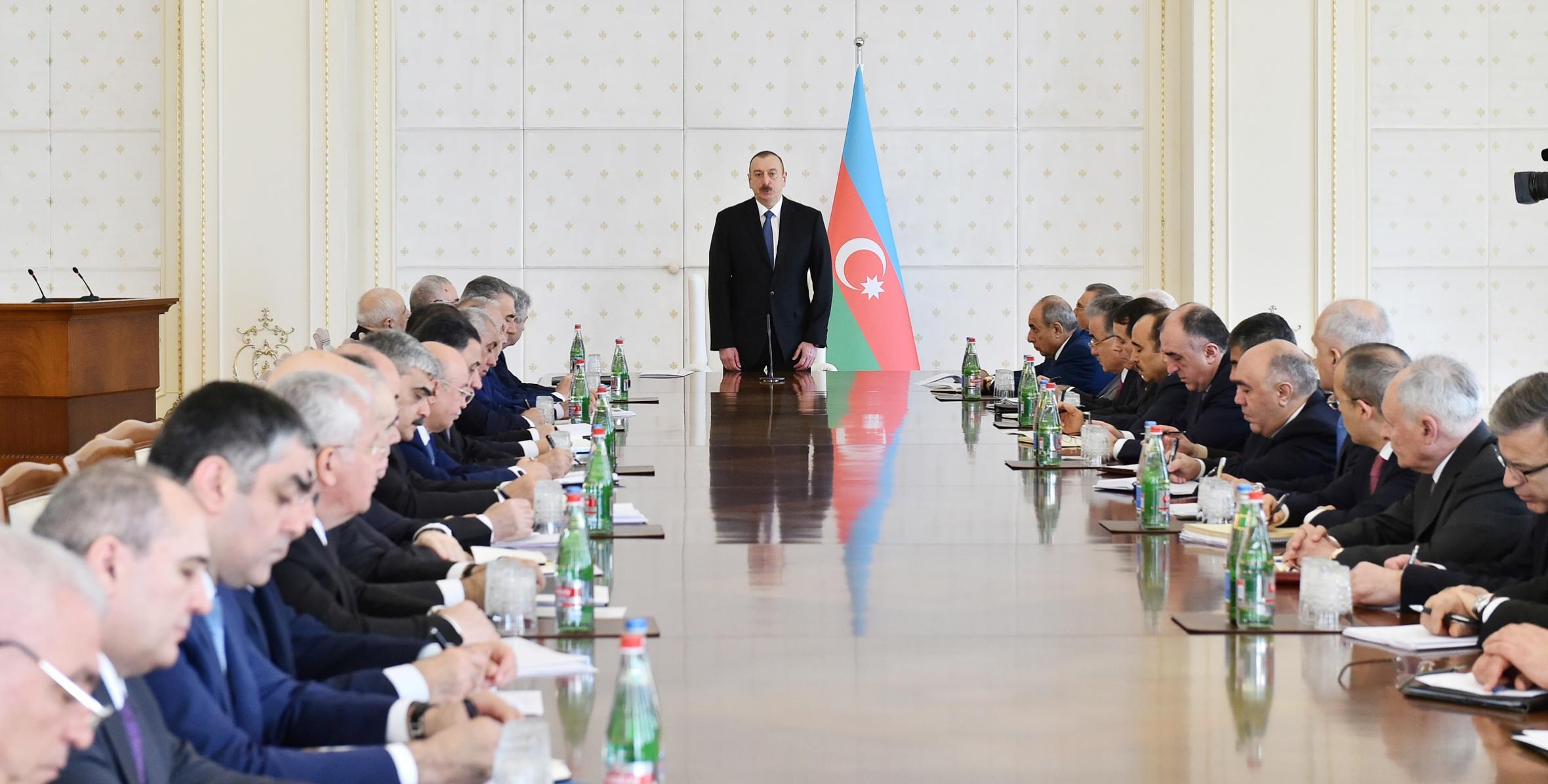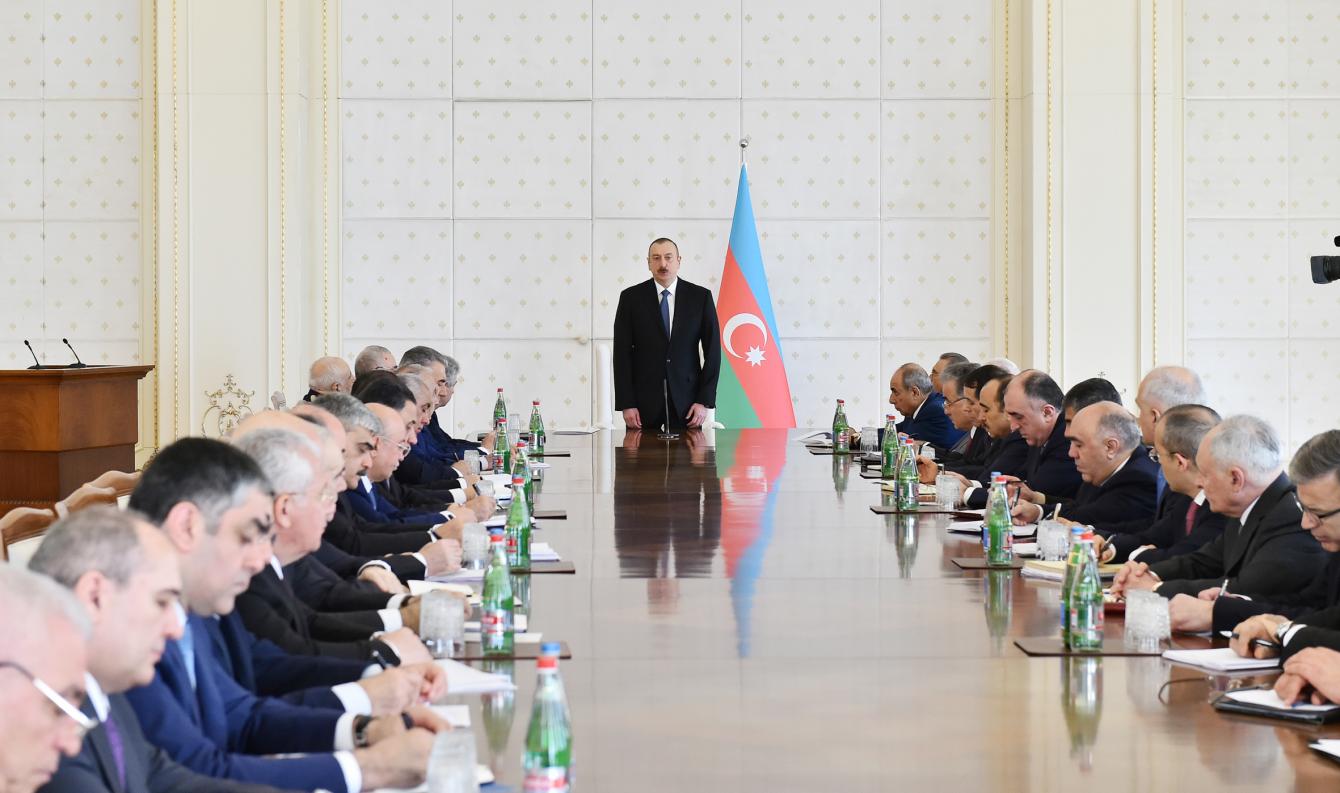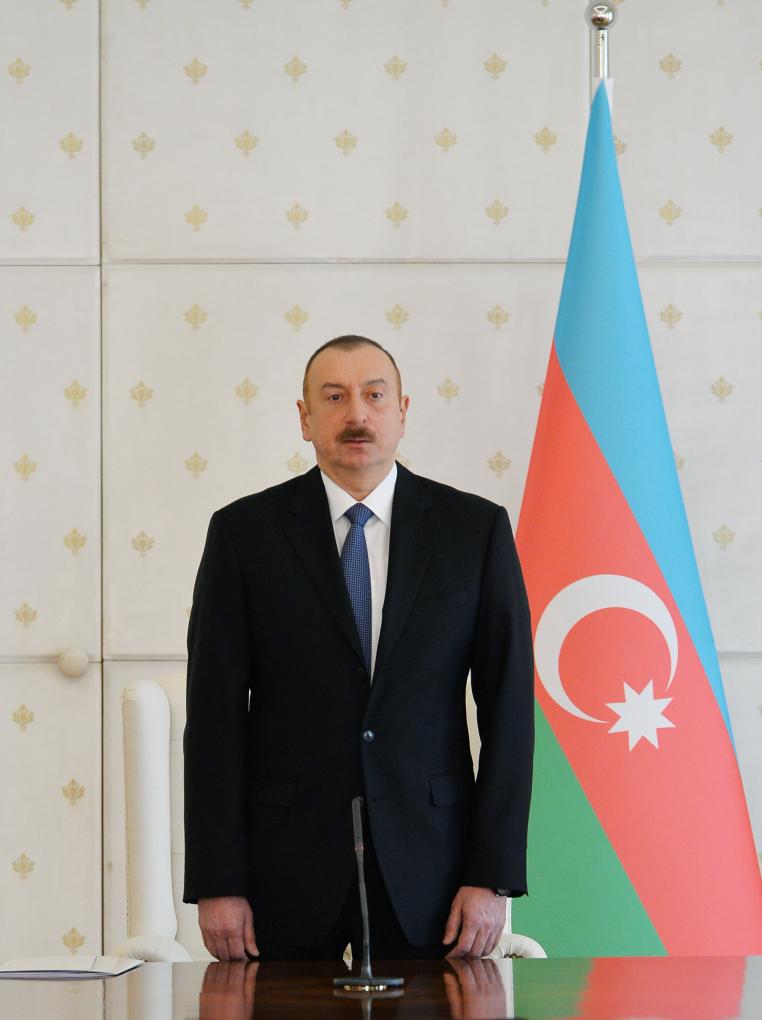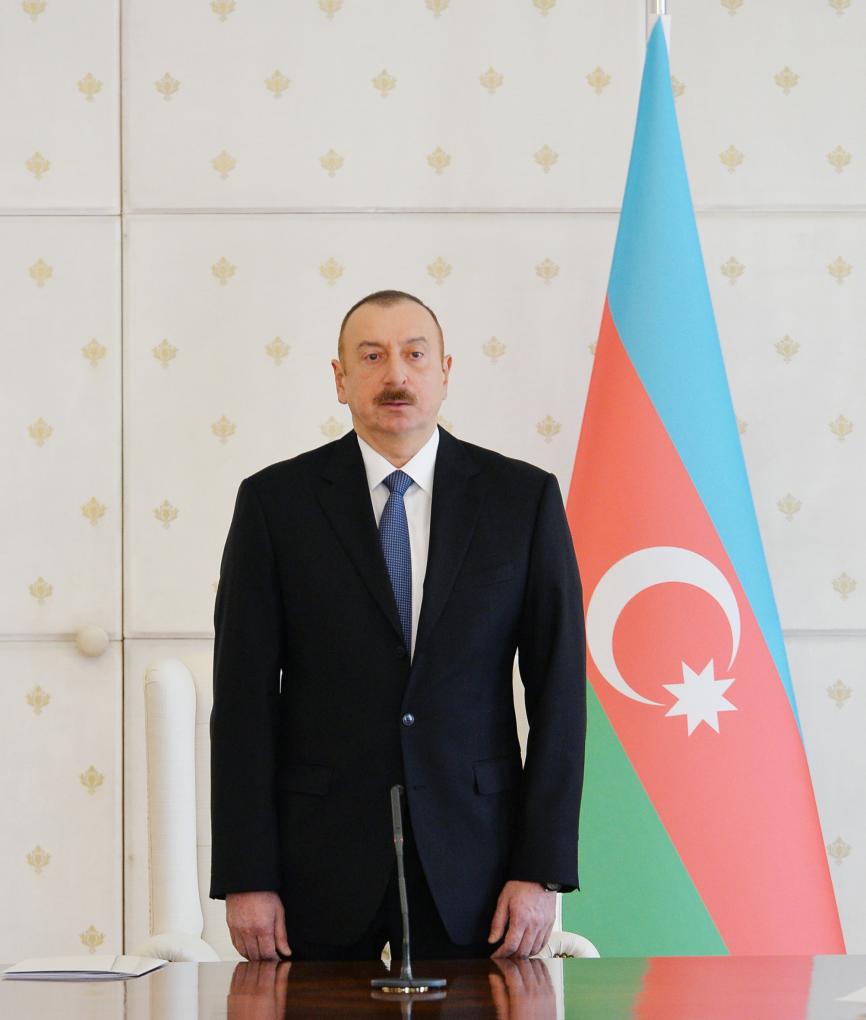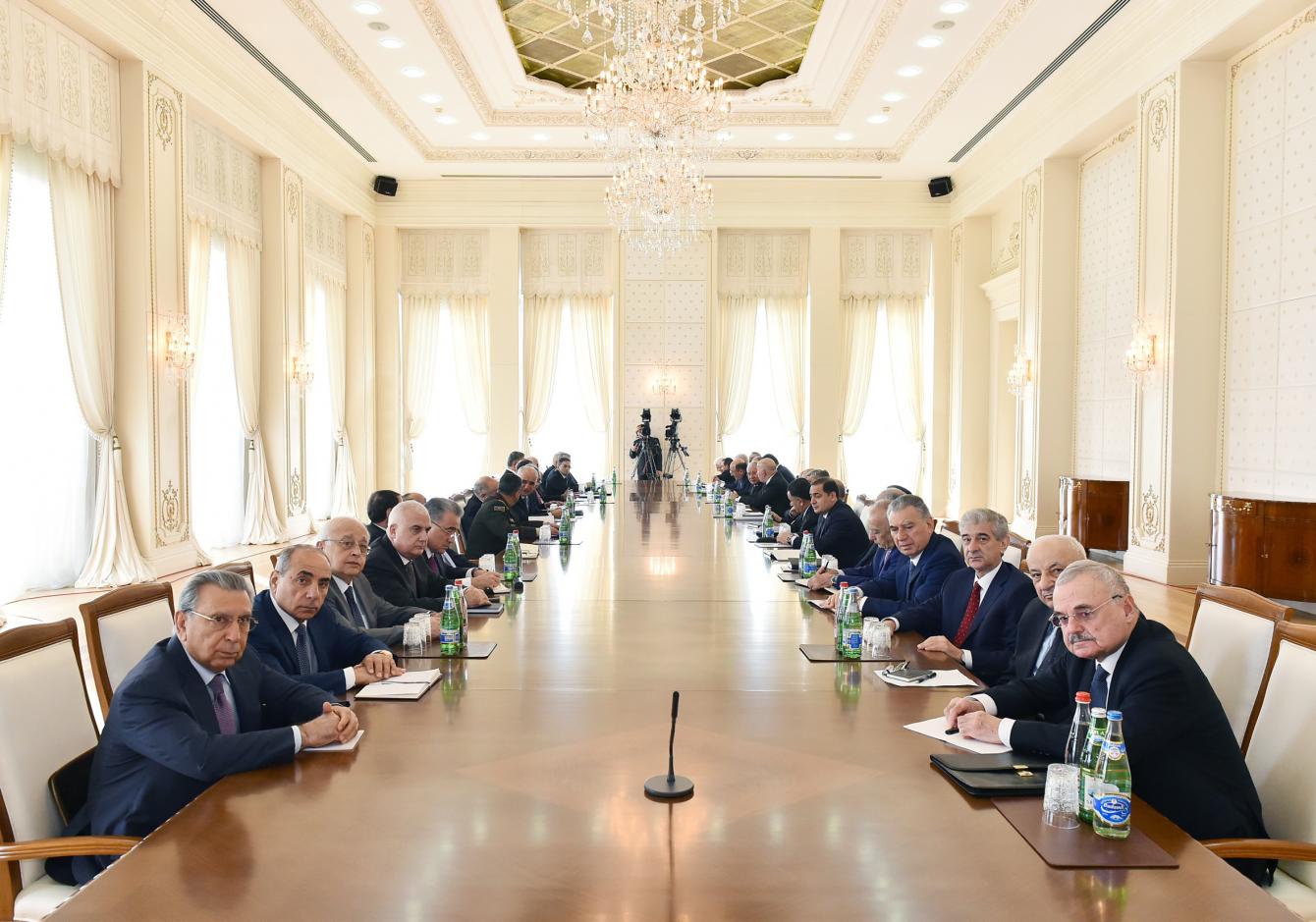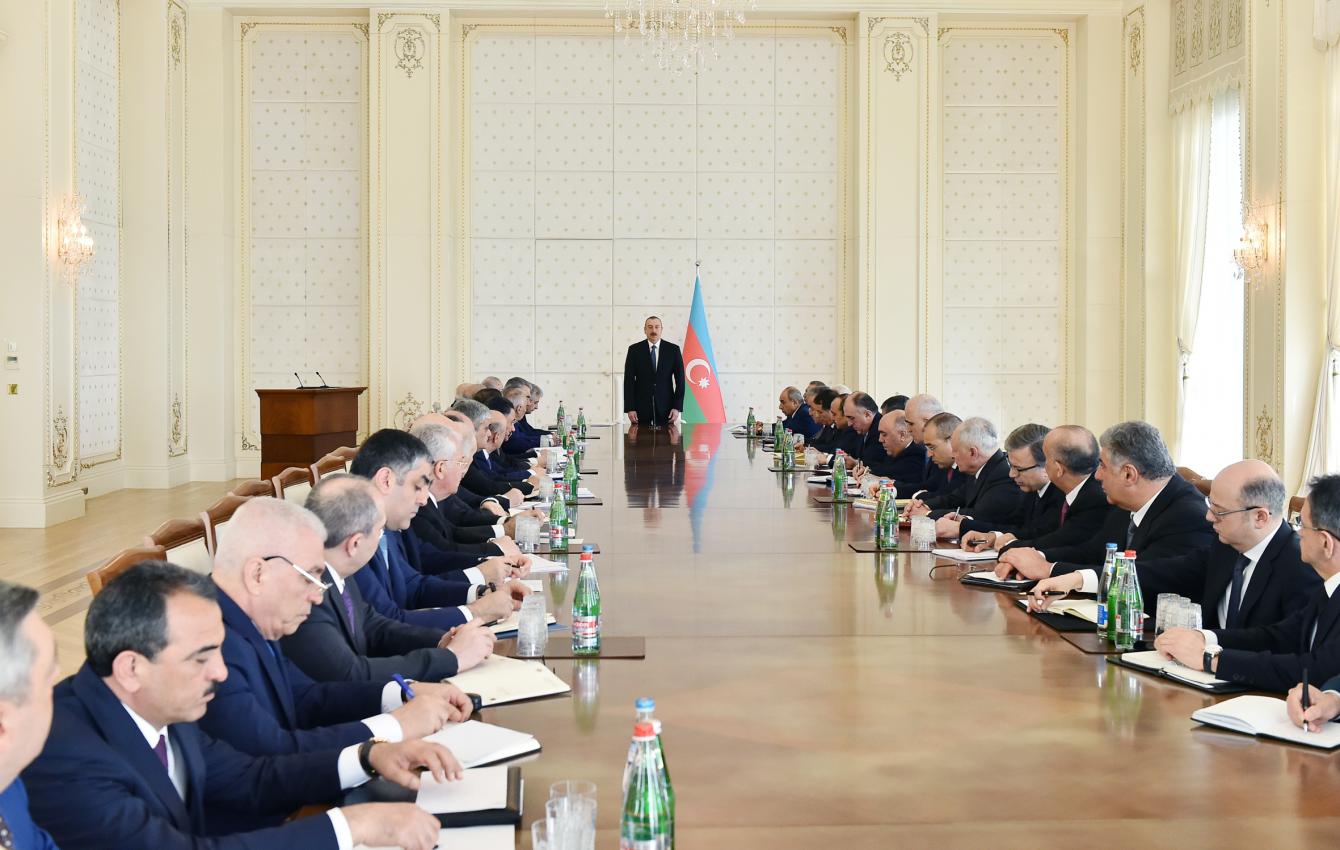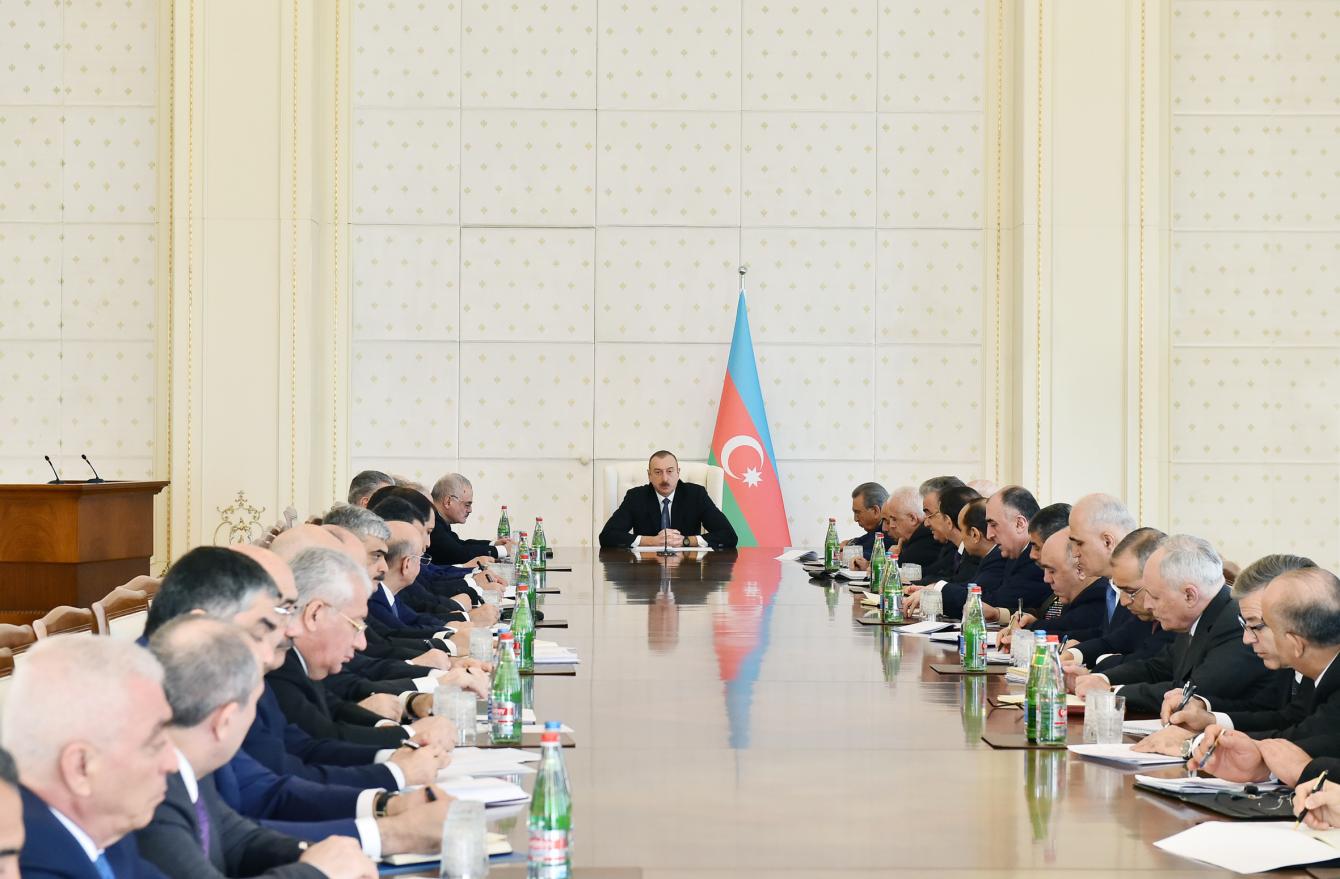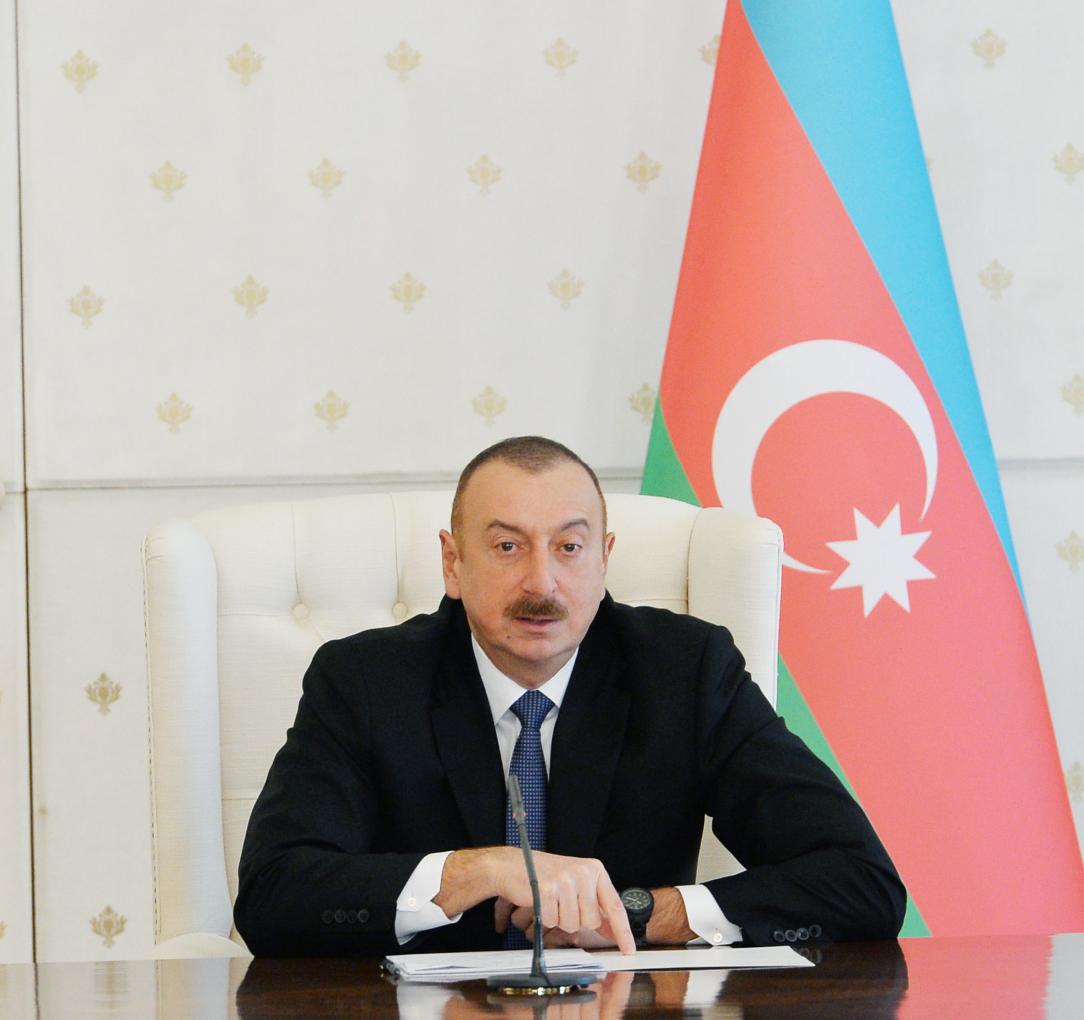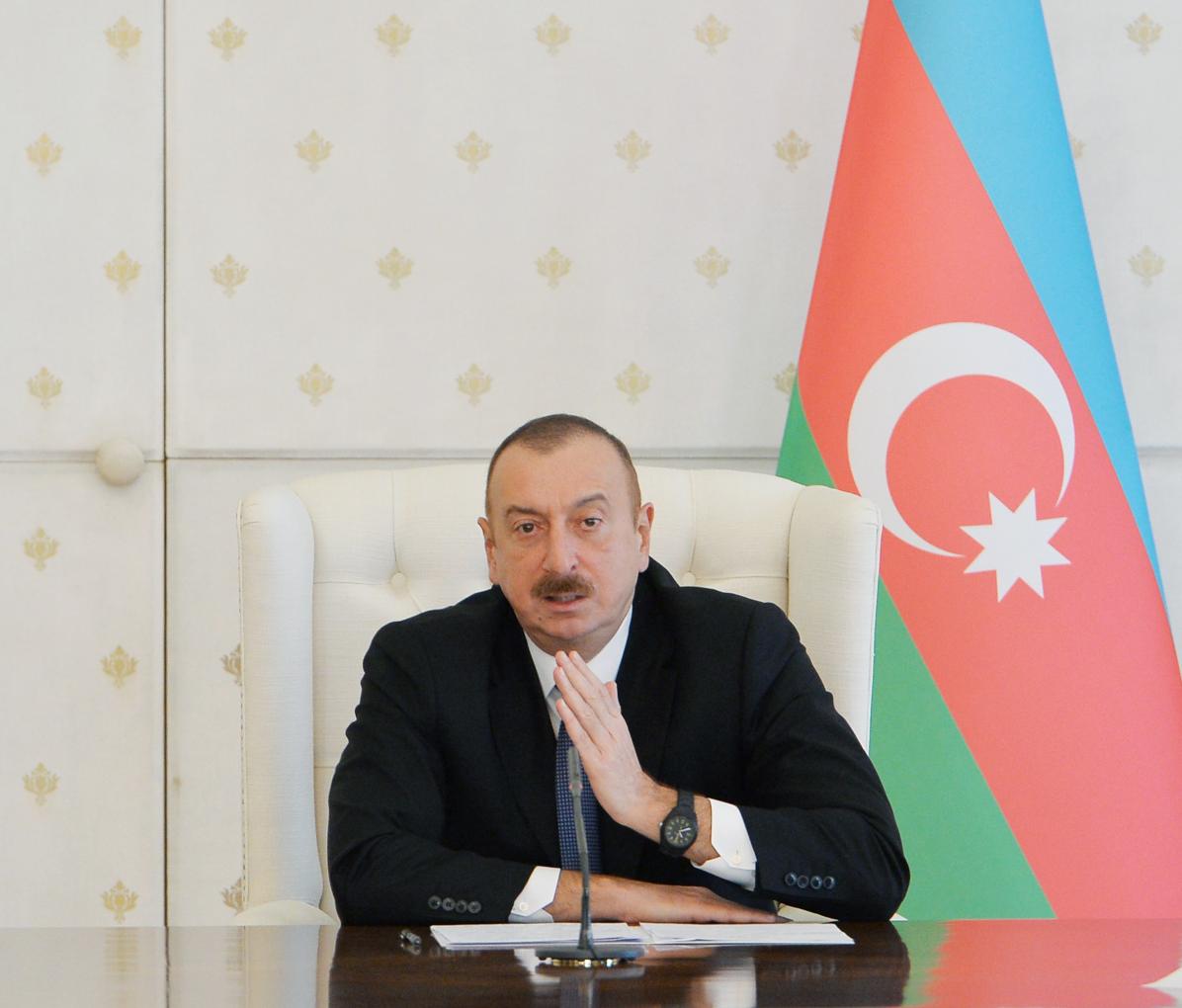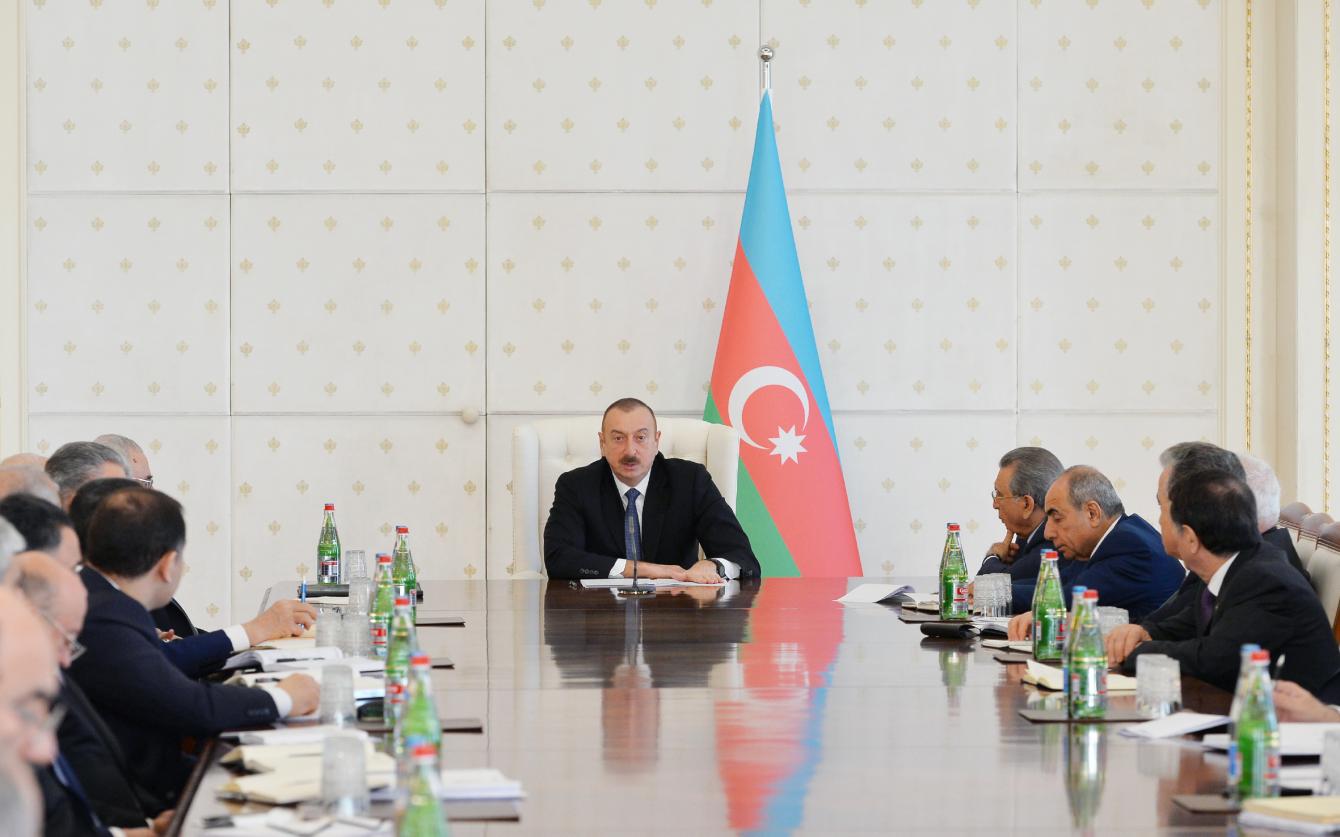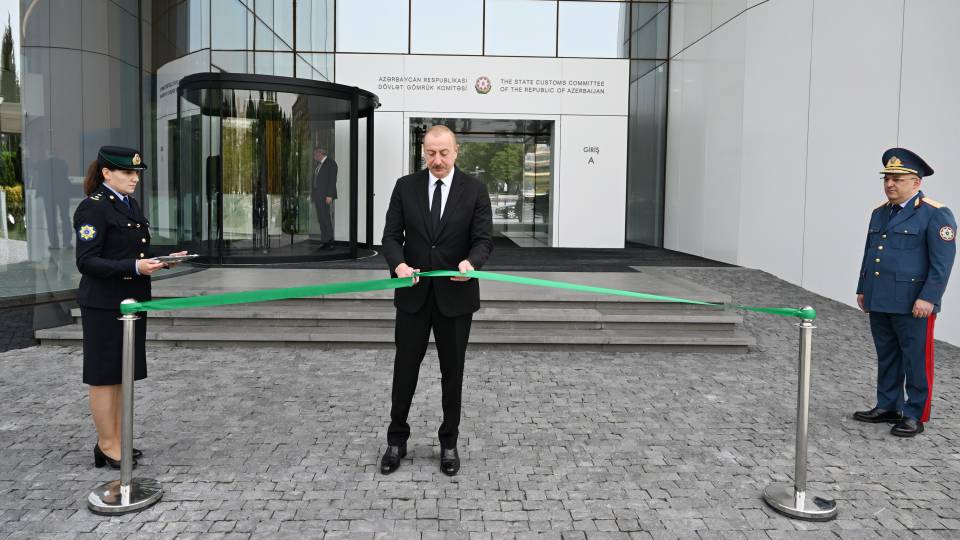President of the Republic of Azerbaijan Ilham Aliyev has chaired a meeting of the Cabinet of Ministers dedicated to the results of socioeconomic development of the first quarter of 2018 and future tasks.
The head of state made an opening speech at the event.
Opening speech by President Ilham Aliyev
- In the first 10-day period of April this year, as is the case every year, we discuss the social and economic results of the first quarter of the year and talk about plans for the future. At the beginning of the year, I expressed my confidence that 2018 would also be successful for our country, and the results of the first quarter confirm my words. During this period, Azerbaijan successfully developed, all our tasks are being overfulfilled, our country is strengthening and comprehensively developing. I am sure we will maintain the positive dynamics until the end of the year and further increase it so that our country can successfully complete 2018.
In the first quarter of this year, our country hosted a number of high-profile events. They enhance the international image of our country and demonstrate Azerbaijan to the world as a modern and developing country. Among these events, I want to specifically note the Sixth Baku Global Forum. This forum is an international platform which has won a great deal of respect on a global scale in a short period of time. The Baku International Forum has earned a worthy place among the world's leading forums in a short time. This is confirmed both by the issues discussed at the forum and the list of attendees. This time 47 active and former heads of state and government from more than 50 countries took part in the forum. This demonstrates the significance of the forum. The letters the Forum has received from world leaders are certainly evidence that it really is a major international event.
Seven heads of state and government visited our country in the first quarter. These visits play an important role in the development of our country's bilateral relations with friendly countries.
A format for quadrilateral cooperation with neighbors was launched within the framework of regional cooperation for the first time on our initiative this year. Of course, this and other formats of cooperation play a major role in addressing the problems existing in the region and contribute to stability, security and development. This year, our country hosted a conference of foreign ministers of the Non-Aligned Movement. This is a very important international event. As you know, the Non-Aligned Movement is the second biggest organization in the world only to the UN. We joined this organization seven years ago and managed to earn a great deal of sympathy and respect in a short time. It is thanks to this that such a prestigious international event was held in our country. In addition, I would like to add that starting from next year Azerbaijan will assume presidency in the second major organization of the world. This is a manifestation of great respect and confidence in Azerbaijan on the part of 120 countries. Azerbaijan is very successful in this large organization.
I should note that on our initiative the Non-Aligned Movement adopted an important resolution on the settlement of the Armenia-Azerbaijan Nagorno-Karabakh conflict within the territorial integrity of our country. This time too, at the conference held in Baku, our fair position in relation to the Armenia-Azerbaijan Nagorno-Karabakh conflict was confirmed once again.
Within the framework of all these international events, and as a result of visits to Azerbaijan and talks carried out in a bilateral format, our international positions have become even stronger. I can say that in all the meetings I bring to the attention of my colleagues and others the position of Azerbaijan related to the settlement of the Armenia-Azerbaijan Nagorno-Karabakh conflict and the realities concerning the conflict. Every time I note that Nagorno-Karabakh is ancestral and historical Azerbaijani land occupied by the aggressor state. As a result of this occupation, more than a million Azerbaijanis were subjected to ethnic cleansing. Our lands are under occupation, our historical monuments and mosques are destroyed by Armenian vandals. I want to emphasize that all international organizations have adopted fair resolutions in connection with the conflict that are based on international law. This conflict must be resolved only within the framework of the territorial integrity of Azerbaijan. The result of these meetings and, in general, our activity in this direction is that the legal framework for the settlement of the Armenia-Azerbaijan Nagorno-Karabakh conflict has been fully established today. No state recognizes and never will recognize the self-proclaimed "Nagorno-Karabakh Republic". No-one recognized the "referendum" held by the regime of the criminal junta last year. This is yet another blow inflicted by the international community to the invaders. Thanks to our efforts, this self-styled entity is regarded as a black spot on the map of the region, and we must continue to carry out consistent work in this direction. Our work in international organizations is very important. It is true that there are no tangible results of this yet, as our lands are still under occupation. We have liberated a part of our lands by military means, but at the same time the legal framework is the main prerequisite for the settlement of the conflict. Azerbaijan has gained full advantage in this matter, and our activities in international organizations will get even stronger in the coming years.
I must also note that as a result of our activities, as well as a new approach to separatism that has raised its head in Europe, the resolution adopted at the conference of Eastern Partnership countries in connection with conflicts in the European Union also reflects justice and international law. The resolution reaffirmed the territorial integrity, sovereignty and inviolability of the borders of the countries included in this Program. Along with this, we are pursuing and will continue to pursue a consistent policy in all other directions in connection with the conflict settlement. First of all, after the political approach, the military factor plays and will play a role, of course. Army building is a priority for us today and will be a priority tomorrow. In recent years, we have been able to create a powerful military potential, which has placed the Azerbaijani army on a par with strong armies on a world scale. This is confirmed by all organizations dealing with international issues and ratings. We will continue to acquire the most advanced weapons, ammunition and hardware, so that our military superiority is always ensured, as is the case today.
This year, the Azerbaijani army conducted large-scale military exercises. These exercises once again demonstrated our strength and frightened the enemy. We know that they were in a panic for several days and eagerly waited for the exercises to end. So it is already a reality and truth. The military factor plays an important role in a fair settlement of the conflict, and we will continue to strengthen our military potential.
In parallel, it is possible to say that all our regional steps and initiatives are designed to secure the interests of the country, develop the Azerbaijani economy and isolate occupier state. All these factors have already joined in one and are proving effective. Armenia today is a country of no interest. No investment is made there. For comparison, I can say that investments in the amount of $3.5 billion was made in the Azerbaijani economy in the first quarter of this year, the overwhelming majority being foreign investment. A total of a little more than $200 million was invested in the Armenian economy last year. A significant portion of this money was invested by foreign diaspora organizations. So it is an incomparable situation, and we, of course, will continue to keep Armenia on the sidelines of all regional projects. Armenia has turned into some kind of a dead end. We are turning them into a political impasse, an economic, energy and transport impasse, and this policy will be continued. We are not making a secret of this, are openly declaring this, and we are right. We want our lands. We want the conflict to be settled as soon as possible so that the territorial integrity of our country is restored and our compatriots return to their native lands. This is a priority issue for us. We have mobilized all our forces to achieve a settlement of this issue.
Of course, I have repeatedly said that in order to achieve what we want, we must become even stronger. Unlike Armenia, we live at our own expense and our destiny is in our own hands. It goes without saying that economic policy is brought to the forefront in this case. I have repeatedly said that economic independence forms the basis of political independence, and in this sense the results of the first quarter are very positive. At the end of last year, I said that 2017 was a year of stabilization. Even in 2017, very positive results were achieved in the development of the non-oil sector. As for 2018, I said without a doubt that it would be a successful year, a year of rapid development. The results and socioeconomic indicators for the first quarter confirm my words. In particular, Azerbaijan's economy grew by 2.3 per cent in the first quarter. This is an excellent indicator exceeding growth rates on a global scale. Growth in the non-oil sector amounted to about 3 per cent. This is the result of our policy towards economic diversification.
In the first quarter, industrial production increased by 2 per cent and the non-oil industry by about 10 per cent. This is the result of the policy of industrialization our country has pursued in recent years. Our non-oil industry has increased by 10 per cent, and I think that this can be considered as a record indicator. Agriculture grew by 4.2 per cent. We see growth in crop production – by more than 50 per cent. This is due to the cultivation of traditional and other technical products in recent years. This is also a very positive indicator.
As I have already noted, a total of $3.5 billion has been invested in the country's economy, a significant part of this being foreign investment. This shows that our country is very attractive for foreign investors.
Our foreign exchange reserves have increased by $2.2 billion and now amount to $44.2 billion. I believe that an increase of foreign exchange reserves by more than $2 billion over three months indicates that, on the one hand, we are using these reserves very economically and, on the other, this is the result of our successful oil policy in recent years. These funds also include a bonus of $450 million from last year’s extension of the contract for the Azeri-Chirag-Gunashli field.
Our foreign trade turnover grew by 31 per cent. This is also an excellent indicator. Exports, or non-oil exports to be more exact, have increased by 37 per cent. Overall exports have increased by 24 per cent and non-oil exports by 37 per cent. This is a good example of our policy because the diversification of exports is our top priority in the economic sphere in order to get more currency in the non-oil sector. This, in its turn, will strengthen local production, create jobs and develop our country even faster.
As for job creation, 34,000 jobs were created in the first quarter, including 31,000 permanent ones. We are already approaching the creation of 1.5 million jobs. If we add figures for the first quarter, we will have about 1.5 million permanent jobs created in Azerbaijan since 2004.
Of course, these economic indicators are very encouraging for us. I must also add that inflation was only at 4 per cent in the first quarter. I shared my opinion on this at the beginning of the year and expressed confidence that inflation would be low and population incomes would exceed inflation. And so it happened. Incomes of the population have increased by about 10 per cent and inflation by only 4 per cent. These are the main socioeconomic indicators we achieved in the first quarter. I believe any country can feel proud of such indicators, including us. This shows that we are on the right track. Azerbaijan has no economic and financial difficulties. By creating a strong economy, we also take steps to address social issues. If we did not have economic opportunities, how could we raise pensions and salaries?! How could we make major investments or carry out infrastructure projects?! Economic power and our policies have created all these realities.
With regard to social issues, I should note that salaries and pensions were raised in the first quarter. Hundreds of millions of manats were allocated from our state budget for that. This shows once again that the people of Azerbaijan are at the center of our policy. As soon as the opportunity presented itself, we took the first step in the social direction. We took tangible steps to ensure social protection of our people.
As for the social infrastructure, all issues stipulated in the State Investment Program for the first quarter are being addressed. New hospitals and schools are under construction. Since the beginning of the year, I have issued numerous orders to address these issues. New sports facilities and ASAN hidmət centers are being built. In other words, there is a great revival in the construction sector in Azerbaijan today. There is progress in the construction of social housing through the State Housing Agency. In general, major funds are invested in the private sector, in the construction sector today. There are plans to build about 150 multi-storey buildings in Baku alone. The construction of many of them has already begun. This, of course, has a positive impact on the construction sector, the sector of construction materials and creates new jobs. I should note that we intend to create additional jobs in the public sector this year. The new bodies being created both in state agencies and district executive authorities attract people to work. If we take into account the number of people involved in public works and work in state companies, there are plans to create more than 50,000 jobs in the public sector alone this year. We began to take these steps two years ago, when the global economic recession had a certain negative impact on us. Some jobs were made redundant, some private companies fired people. So the government took this step immediately. We created tens of thousands of public jobs, and this process continues today. In particular, when I visit the regions I always enquire about public works. This is very important for keeping unemployment in the regions low. Hundreds of people in each district are involved in public works. Major construction and repair works are under way in Azerbaijan these days – the renovation of buildings, the creation of parks and the landscaping of these parks. Our main goal is to keep unemployment always at a low level. So the solution of social issues is directly related to our economic opportunities. The stronger we are economically, the more successfully we will address social issues.
All infrastructure projects were successfully implemented in the first quarter. Of course, we have taken very important steps related to the creation of the Southern Gas Corridor. The Fourth Advisory Council meeting was held in Baku in February. As a result of the discussions held at this Consultative Council, a statement was adopted. This document reflects the leadership of our country again. There is little time left for the implementation of the Southern Gas Corridor. We are successfully marching in this direction. Three important parts of this project will be completed this year: TANAP, the South Caucasus Pipeline and Shah Deniz-2. So this is our historic achievement, and we have taken important steps in this direction this year.
The agreements reached in the transport sector this year – in essence, they have been achieved on the basis of work done in previous years – will lead to the creation of the North-South transport corridor. An impetus has been given to the construction of its remaining part. As you know, Azerbaijan has completed all work related to the North-South transport corridor on its own territory. From now on, only work related to the modernization of the railway will be carried out to further increase the speed. But we have all the railway infrastructure – the railway linking our northern and southern borders. The funds have been invested, and we are now paying serious attention to this issue from the regional point of view. Very important steps were taken in this direction in the first quarter.
The overall dynamics of development in our country is very positive. Our country is better known in the world. The number of tourists is gradually growing – it has increased by 12.5 per cent in the first quarter of this year. If we take into account the previous years as well, we can see that there is consistency in this trend. There are many reasons for this: the stability and security available in Azerbaijan, the hospitality of our people, our historical monuments, infrastructure, six international airports, roads, hotels, etc. Of course, the international events held in our country demonstrate Azerbaijan to the whole world. A special role among them belongs to the European Games, the Games of Islamic Solidarity, the Eurovision Song Contest and Formula 1 competitions, because the viewer audience of Formula 1 is about half a billion people. These competitions take place in the center of our city. We specifically organized them in order to show our city, so that the fans watching the competitions could see not only the competition proper but also the beauty and modern appearance of our city, so that they would want to come to Azerbaijan more often as tourists.
In short, the results of the first quarter are positive. Of course, a number of important issues have been resolved in the first three months. It is impossible to cover it all in just one opening speech. I have simply shared my thoughts on the main issues. The Azerbaijani people know that regular meetings of the Cabinet of Ministers serve practical purposes. At the same time, they represent reports on the work done.
Speakers at the meeting included chairman of Azerishig Open Joint Stock Company Baba Rzayev, chairman of Azersu Open Joint Stock Company Gorkhmaz Huseynov and chairman of the Board of the State Housing Construction Agency Samir Nuriyev.
President Ilham Aliyev then made a closing speech.
Closing speech by President Ilham Aliyev
- As I mentioned in my previous speeches, 2017 was a year of profound economic reforms in Azerbaijan. These reforms are continuing this year too. We can be proud of our performance in the first quarter. These indicators reflect the successful development of Azerbaijan. But we should not be complacent with the successes achieved and must continue the reforms.
Sometimes the question arises: oil prices have somewhat stabilized, so will the reforms be continued? They certainly will. Oil prices should not be the main factor for us. The Azerbaijani economy should reach a level when oil prices do not have much influence on us but only serve to increase our reserves. As I mentioned in my opening remarks, in the first quarter of this year we received additional funds in the amount of $2.2 billion. Therefore, economic reforms will be continued this year. It is not only economic reforms, however. Reforms will be carried out in all other areas, so that to further strengthen and modernize our country and to ensure that Azerbaijan achieves sustainable and long-term development. Many issues are on the agenda to achieve these goals. One of them is the improvement of the business environment. Some good results have been achieved in this direction in recent years. The Doing Business report released by the World Bank suggests that Azerbaijan has consistently strengthened its positions and advanced to a higher level. But we must continue our efforts in this direction. In particular, it is necessary to take more serious steps in matters that slow us down, and we are doing that. The Doing Business rating is prepared on the basis of an in-depth analysis. The progress we make in this direction and any miscalculations are seriously analyzed.
Therefore, the steps aimed at improving the business environment will continue to be taken in the future too. As I know, the serious reforms carried out recently, the recovery process in the tax system are positively perceived in the business environment, and additional steps will be taken in this direction. I have repeatedly said in my previous speeches that we should apply the world’s most advanced and transparent practices in Azerbaijan. Our entire financial system should work as an absolutely transparent mechanism.
The steps taken in the field of economic competitiveness in recent years deserve great approval. I have repeatedly said this and I want to say it again today: the 35th place we currently occupy in terms of economic competitiveness according to the calculations of the Davos Economic Forum is a historic achievement. Today we are one of top 35 most competitive economies in the world and are rightfully proud of this. However, we should also know that other countries are also very attentive to Davos ratings. As far as I know, many countries are trying to improve their standings even more. Therefore, this great figure should only encourage us to take further steps.
Azerbaijan ranks third among developing countries in terms of inclusive development. I consider this a historic achievement. We are ahead of many countries with great economic opportunities, although we have lived as an independent country for only 26 years. Therefore, the ratings prepared by leading international organizations reflect our successful policies. However, let me repeat that we should not feel complacent with the results achieved. We must develop continuously. We need to take additional steps to develop entrepreneurship as well.
These comprehensive measures are the result of our policy. This year, the government is to allocates 170 million manats on preferential terms for entrepreneurs. These funds are allocated at the expense of the loans granted and repaid earlier. This once again testifies to the success of our policy because the loans amounting to more than 2 billion manats are now returning and serving new loans.
The enterprises created with the support of the state serve to create jobs and also strengthen local production. I want to say again that we have a comprehensive approach to the development of entrepreneurship. Institutional reforms are and will be conducted. Entrepreneurs are provided with financial resources and methodological recommendations, the state purchases agricultural machinery and provides subsidies, and major funds are spent on land reclamation in order to create better opportunities for agriculture.
The road and other infrastructure, electricity, drinking water and gas communications – all this work serves our people, as well as entrepreneurs. Therefore, the development of the non-oil sector will be the main priority in the field of economic policy in the coming years, and the decisions made in this direction are producing excellent results. Among them, I would like to highlight the investment promotion mechanism. We have recently started using this mechanism and achieved excellent results in a short time. In the first quarter of this year alone, 28 investment promotion documents were issued, bringing the total number of investment promotion documents granted to date to 257. A total of 229 entrepreneurs have benefited from these opportunities. The volume of investments already made and to be made in these projects amounts to 2.3 billion manats. Have a look: if we had not engaged the investment promotion mechanism, then these funds would not be invested in the country’s economy. These funds are being invested. These are major funds and, according to preliminary estimates, 17,000 new permanent jobs will be created within the framework of this program alone. Look how many additional products will be manufactured, and these will be competitive products because state agencies are very attentive to these issues. I am sure that a significant portion of these products will be exportable. So have a look at the benefits of the reforms carried out only in one direction. So when I talk about the need for deepening the reforms, these are not just words. They are underpinned by very serious programs. The mechanisms to encourage and promote investments have already been engaged and entrepreneurs are also using them. We must bring the most advanced practices existing in the world to Azerbaijan, test and apply them.
It is gratifying that industrial production in Azerbaijan is growing. Over the past year or two, as a result of the drop in oil price and a certain decline in oil production, industrial production in Azerbaijan has decreased. The non-oil industry increased, albeit only by a little, but the overall industrial production was in decline. There was a turning point this year and, as I have already noted, industrial production increased by 2 per cent and the non-oil industry by 9.9 per cent, or by about 10 per cent. This is an excellent indicator. I want to say again that it reflects our policy and is the result of our work. The policy of industrialization will be continued in Azerbaijan in the future.
I believe that the creation of industrial estates and industrial parks has already yielded excellent results. Several of our industrial estates have already started to operate. The Sumgayit Chemical Industry Park, the Neftchala and Mingachevir industrial estates are currently in operation. At the end of last year, four enterprises were opened and the foundation of three more was laid in Sumgayit. Two giant plants will be put into operation this year. The SOCAR Polymer and nitrogen fertilizer plants will significantly accelerate our industrial development. About $2 billion has been invested in the construction of these plants. There are currently 17 residents at the Sumgayit Chemical Industry Park. In general, investments will amount to $2.8 billion. If we had not created the Sumgayit Chemical Industry Park at the right time, these funds would not have been invested: $2.8 billion and another 2.3 billion manats under investment promotion documents. These funds would have remained in the hands of entrepreneurs. Since much of these funds is credit resources of course, they would not have been invested and industrial development would not have been possible.
We are now creating similar estates in many regions. I would like to specifically mention the Mingachevir light industry park. Mingachevir is growing and its population is increasing. There were problems with jobs in Mingachevir, and these problems still exist today. There are no agricultural lands around the city. Therefore, Mingachevir should develop only as an industrial and tourist city. Very important steps have been taken in this direction: in connection with the infrastructure, roads, drinking water and other issues, including the creation of jobs. Two large enterprises were opened in the Mingachevir light industry park this year – two spinning mills. They account for half of the spinning mills set up in Azerbaijan to date. They will produce 20,000 tons of yarn, a significant part of which is to be exported. At least 700-750 people will be provided with jobs work. In other words, the Mingachevir light industry park is already functioning, and we look forward to receiving proposals related to the creation of new enterprises in the coming months.
We have recently marked the opening of an automobile plant in the Neftchala industrial estate. It is also evidence of the development of our industry. The Neftchala industrial estate was inaugurated with my participation last year, and a plant with a capacity of 10,000 automobiles a year was opened this year. The plant will employ more than 300 people, produce competitive automobiles for both domestic and foreign markets. Of course, state agencies, as I said in my speeches earlier, should give preference to local cars. State bodies should strictly monitor this issue.
According to our statistics, the number of cars imported in the first quarter of this year has sharply increased. Of course, this is a manifestation of economic recovery and a testament to the fact that people now have additional financial opportunities, which have dramatically increased. This in itself is a positive indicator, but it also means that the outflow of our currency abroad has also sharply increased. Therefore, at least state bodies should purchase the cars produced in Azerbaijan. I am sure that our people will be convinced that these cars meet high standards and their price is more affordable in comparison with cars imported from abroad.
The Ganja Automobile Plant has recently produced its 10,000th tractor. This is also a manifestation of our cooperation. We are providing farmers with "Ganja-Belarus" tractors now. There is a great interest in these tractors. When I travel to the regions and see the fields, I always enquire about that. All farmers praise these tractors. If this plant hadn’t been established at the right time and if it did not produce tractors, we would have to buy all this hardware abroad. So much money would have been spent! Now we export them and are starting the production of "Ganja-Belarus" tractors in third countries. These results suggest that the activities of the Hajigabul, Masalli and Sabirabad industrial zones being created will also be successful.
Concerning agriculture, I already said in my opening remarks that growth constituted 4.2 per cent. This is a good indicator, especially in crop production. Much of this is associated with the production of cotton. In the coming years, of course, we should pay more attention to issues of food security, in particular, grain growing and livestock breeding. We have taken very serious steps related to the development of traditional technical products. Numerous meetings have been held. Grain growing and livestock breeding are key contributors to food security. As far as I know, wheat crops are expanding and new areas are included in the turnover with the support of the state and as a result of the activities of private businesses. Irrigation is provided. This area should be given very serious attention so that we can fully provide ourselves with staple foods. At present, we provide ourselves with meat and dairy products at about 80-90 per cent, but as far as wheat is concerned, the figure is lower. Therefore, this area, as well as the production of poultry meat, should receive more attention and investments in the coming years.
I hope and am sure that the 45 agricultural estates being created will significantly increase our export potential. Of these estates, 28 are engaged in plant growing and 17 in livestock breeding. This will serve food security and, at the same time, expand our export opportunities. We must find new export markets. Work is currently under way in this direction. Export missions are being sent to different countries. We should be more active and achieve serious results, so that contracts are signed and our products reach other new markets. Of course, steps are being taken to consolidate our positions on traditional markets. At present, new greenhouse complexes are being created on 400 hectares and more. Some of them have already started to operate. The main markets for these greenhouses should be sought abroad because we provide ourselves with vegetables in excess.
The process of acquisition of agricultural machinery will be continued. A total of 160 million manats are provided for this purpose this year. At least 5,000 units of equipment should be imported. Last year we imported 10,000 units of equipment, but this process should be continued because we still have a lot of old equipment. There is also machinery that is no longer operable. We must fully upgrade our depot. We must import equipment of the world's leading manufacturers. In fact, we are doing this.
We have more opportunities for analysis now because the orders placed on "Azexport" domain are actually a very important marketing tool. Previously, we did not have the opportunity to do external marketing. This work was mostly done spontaneously. However, this domain is very important because both local producers can post information about their products there and orders can be placed on this web site from abroad. If we analyze the situation, we can see that we can’t fulfill some orders completely. This shows the way to state bodies and entrepreneurs – these areas need to be developed. Of course, I would very much like the agricultural processing sector to develop faster. We can’t be satisfied with the present level of development. True, many factories for the production of canned food and juices have recently been commissioned. Of course, this does not fully reflect our potential. However, it would be good if products from the greenhouses to be built on 400 hectares were partly, and preferably mostly, processed in Azerbaijan and exported. The highest income among agricultural products is currently fetched by the export of tomatoes. But if new processing enterprises are established here, we will be able to export finished products. Finished products are in greater demand and have less competition. Therefore, I believe we must step up our efforts in the area of processing of agricultural products. We have been giving preference to production recently, and are providing loans. Starting from this year, it is necessary to draw up a serious and specific plan – what processing enterprises, canning and juice factories can be opened in which regions.
We will continue to work on agricultural sectors capable of providing exportable goods. Some time ago, I issued the instruction to seriously analyze issues related to viticulture and winemaking because we can’t be pleased with the current situation. Preliminary data suggests that we have a sufficient processing capacity, i.e. wineries, but many of them work very poorly. In other words, they work to 20-30 per cent of their production capacity. I do not know why entrepreneurs built these plants earlier. Maybe they had a lot of money and did not know where to invest it – they built the wineries but are not using them rationally. This does not fit into any logic. So our goal now is to make sure that entrepreneurs manage these wineries properly. The production of grapes is growing, new vineyards are emerging, and I welcome that. Wine exports are also increasing, and the state plays a role here too. This is becoming possible thanks to our export missions and participation in exhibitions. However, it is necessary to take regular and specific steps related to viticulture and winemaking. We have adopted a state program. I can’t say that this program is being executed at the proper level. It is necessary to review it and analyze what we have achieved as a result of this program. I repeat that new wine plantations are being set up, the production of wine exported to foreign markets is growing, but this should become a fine export product.
The work carried out in connection with cotton growing in recent years has contributed to a recovery and revival of this sector. Several regional meetings have been held, and the key issue here is to eliminate unemployment. Cotton growing provides jobs to about 200,000 people who were previously unemployed. By increasing the purchase price, we improve the well-being of the people working in the fields. Of course, if such a powerful impetus had not been given to the cotton growing sector, there would be no need for the Mingachevir light industry park because it would be completely irrational from an economic perspective to buy cotton abroad and process it here. Therefore, the development of cotton growing is primarily a social issue and a social initiative. Harvesting companies, farmers and representatives of local executive authorities should know that cotton growing also gives an impetus to local production and increases exports. We procured 207,000 tons of cotton last year and only 35,000 tons in 2015. I also said at the last meeting that from now on cotton growing should be developed only by means of higher yields.
Entrepreneurs have been taking into account our recommendations recently and paying great attention to olive growing. New orchards are being established. The state provides help and extends water lines. This will also be a fine exportable product. There is a great demand for olive oil in the world. Only a few countries in the world produce this oil. Azerbaijan should also take a place among them, provide for the domestic market and also export.
Orchards are expanding. Several meetings on the development of tea and rice growing, hazelnut farming, silkworm breeding, citrus production, tobacco growing and other sectors have been held. I want to cite a few figures, so our people could know what benefits this work brings. Tobacco growing: in 2015 tobacco was sown on an area of 1,300 hectares, but in 2018 the figure will reach 3,300 hectares. We export tobacco now. This is an export-oriented product. Farmers earn well. The state currently purchases drying chambers. The cigarette factory under construction in Azerbaijan will also purchase this tobacco, produce and export cigarettes, and reduce dependence on imports.
The production of cocoons: in 2015, only 240 kg of cocoons were harvested, while in 2017 this figure reached 240 tons. This year we expect about 450-500 tons of cocoons. First of all, this is also a social project for me because silkworm breeders make good money in a short period of time, in 30-40 days, while hundreds of people are provided with jobs at the Sheki silk factory. If we harvest 450-500 tons of cocoons this year, I am sure that the Sheki silk factory will probably work all the year round and there will be enough raw materials. Hundreds of people in Sheki are provided with jobs. Many districts earn money as well.
As you know, hazelnut farming is a traditional sphere for us. It is the second biggest agricultural sector to earn currency only to the export of tomatoes. Here, too, we have worked very hard. We started doing it in 2015, and the area of hazelnut gardens was brought up to 40,000 hectares in 2016. This year, the area of hazelnut gardens will be brought up to 67,000 hectares. So look how much we have expanded hazelnut gardens. This will become a source of large income for farmers and bring currency to our country. But this is not the limit. I am sure that next year we will reach the figure I set earlier because new hazelnut gardens will be set up on 16,000 hectares in the current year and next year. Thus, hazelnuts will be grown on an area of more than 80,000 hectares in Azerbaijan, and we can become of the top three hazelnut producers of the world.
All of this work was done as a result of the instructions issued and their execution. If we had simply waited for someone to come and do this for us, that some investor would come and invest money, all this would have been impossible. At the same time, I want to note that entrepreneurs need to be supported and shown the way. They are often a bit passive, do not show initiative and are lazy even to export their own produce abroad. They wait for someone to come and knock on their door and buy their products. They should look for markets, sign contracts and establish contacts themselves. We advertise our agricultural produce at the expense of the state even on foreign television. They don’t do that either. Let them start acting at least now. The state makes so much effort, provides support, allocates funds and renders political support. Therefore, if we had not started this work, nothing would have happened, 2.8 billion dollars and 2.3 billion manats would not have been invested, agricultural production would not have increased, so many jobs would not have been created and 200,000 people would not have been provided with jobs in cotton production alone. These are the real results of our decisions.
I said in my opening remarks that tourism is developing rapidly in Azerbaijan. From now on, we should have a more systematic approach to this sphere and not sit and wait for someone to visit us. We should attract tourists ourselves. We have made Azerbaijan very well known all over the world. We have a wonderful international image. At present, the number of visitors to Azerbaijan is growing. We are hosting international events. As I have already noted, the hosting of Formula 1 competitions on the streets of Baku alone has given a powerful impetus to the influx of tourists. Security, stability, hospitality, wonderful climate, historical monuments, infrastructure, seven airports, of which six are international, remarkable highways and a simple visa regime – citizens of more than 90 countries today can get visas at the airport. This area will now be improved because, unfortunately, there have been major violations in it. We have canceled visas because tourists were faced with unnecessary hassle at airports and were groundlessly required to pay money. We have eliminated this disgrace. Those who committed this disgrace, these violations and crimes were brought to account. Let everyone know that these crimes will not go unpunished. However, we must create a system capable of attracting more tourists. A new system is being put in place at airports. It will be introduced next month. Visitors should be provided with maximum possible comfort at all our border checkpoints. In some cases, visitors are faced with red tape, delays and are unjustifiably asked for bribes. Those working at these checkpoints are disgracing our people and state. I have strictly warned relevant agencies and reprimanded them. These violations must be eliminated. Those damaging our country’s image will be punished. Border checkpoints should help visitors to avoid hassle.
As for issues related to security, we have enough opportunities and sufficient technical capacity to protect our security. However, this should not be a reason or justification for creating queues at the borders in order to extort money for jumping these queues.
Law-enforcement officers sometimes groundlessly interfere with the work of hotels and cause visitors inconveniences by allegedly ensuring certain norms. Again, the motivation behind this self-interest, the intention to rip off money and fill pockets. This, too, must be stopped. I have repeatedly said this and will say again: any country possessing a tourist potential tries to attract tourists and create conditions for them. Until recently, we waited for someone to knock on our door. People would come to our embassies for a visa, but were faced with hassle and various unreasonable demands. We have eliminated the visas. After that, citizens of more than 90 countries can receive a visa at the airport. One of my foreign colleagues has told me: you have removed visas but instead people from their country are required to provide a photo. I was horrified. What picture?! Does anyone traveling abroad take a photo? So if you don’t have a photo, you should pay and pass through. How can we tolerate such a disgrace! We punished them and the issue of photographs was eliminated. After that, I heard again that foreign visitors are now required to pay money at the airports to pass without waiting in the queue. It is so mean. I can’t even find the right words. What a disgrace! Very serious measures have been taken, and I would like to say one more time: if there are violations in this or any other sphere or if arbitrariness related to bribery continues, very strict measures will be taken and all those responsible will be punished regardless of their former merits.
Our additional steps in the area of tourism are related to the railway. I have already announced this project. We will start the construction of the railway to Gabala this year. This will pave the way for the influx of tourists to that region. Paperwork and feasibility studies related to the construction of a railway to Gusar District are under way in the current year. We will build these railways to the main travel destinations probably next year.
Three ASAN xidmət centers will be opened this year. One of them was put into operation in the city of Mingachevir in February. Two more centers will be opened in Sheki and Imishli. Instructions have been given for the construction of five more centers. These should be opened next year. So we will have 20 ASAN xidmət centers by the end of next year.
Centers for simplified support of family business (ABAD) are being established as well. This is of great importance for the development of both entrepreneurship and business. ABAD centers generate competitive products. I have instructed public companies and advised private ones to pay more attention to this area. This process has already begun.
This year, 5,000 to 6,000 people were covered by the self-employment program. This will be an important step aimed at eliminating unemployment and reducing poverty. There are sufficient funds. It is simply necessary to organize this work correctly, so that those in need have the opportunity to earn money.
This year, we have major plans related to infrastructure projects. Gas supply in our country should reach 95 per cent before the end of the year. It is necessary to complete the construction of the Severnaya-2 power station. This will give us an additional 400 megawatts of electricity. We are exporting electricity to neighboring countries now. We have created an excellent export potential. All domestic needs are fully met, but we need to see how much generation capacity we will need afterwards. We must take into account the development of our country, growth of the population and the process of industrialization. In other words, considering the extensive development, we need to see how much electricity we will need for domestic consumption in five to 10 years. In parallel, we should analyze foreign markets – how much energy we will export to foreign markets in five to 10 years. We should take further steps in accordance with that: whether we should build new stations or be content with the current ones? We must create alternative energy sources – build wind, solar and hydroelectric power stations. So it is necessary to conduct a very serious analysis of this area and submit it to me.
Projects related to drinking water are being successfully implemented. It is possible to say that this work has been completed or is under way in all our cities. I believe that this is also a historic achievement because more than 80 per cent of the city of Baku is provided with drinking water around the clock now. Of course, this figure should reach 100 per cent. I am sure we will achieve that. These projects are being implemented in all our regions and cities. They should also be in the spotlight in most of the villages too.
Land reclamation measures are envisaged for this year. It is necessary to drill more than 300 artesian wells. The supply of water to at least 100,000 hectares of rain-fed land should also be ensured this year.
New roads 2,000 kilometers in length, including highways, inter-city and rural, will be built in the current year. One of them is the road from Sumgayit to the Russian border. It is a new road. It will run parallel to the existing road and facilitate the development of the region. This region has a wonderful tourist potential. Tourist sites can be created along the coast. Over 600 rural roads will be built. Thus, the total length of the roads built since 2004 to the end of this year will reach 15,000 kilometers.
Transport problems of the city of Baku must be comprehensively resolved. It is necessary to do some coordination work. New roads and tunnels are built in Baku these day. This will make municipal transport even more comfortable. A new tunnel is under construction in front of the Olympic Stadium. This is also very important in terms of eliminating traffic jams. A new four-lane road is being built above Lake Boyukshor. This is also a very important project for city transport. We have cleaned a part of Lake Boyukshor. There are plans to clean the remaining part of the lake. A circular railway will be built in Baku. A total of 100 million manats is envisaged in the investment program for this purpose this year. It will be a very comfortable means of transport for the city, an important project for the development of settlements adjacent to Baku and for the comfort of those living there. After a certain break, the construction of the underground has been resumed.
In other words, we must view all these issues in package. There are plans for the purchase of buses. Bus stops, traffic lights, underground, suburban railway, taxi stops: there is a need for unified management of transport in the city of Baku, so that transport in the capital is at the level of leading cities of the world. We currently purchase underground cars, buses and taxis. But coordination is weak. Therefore, very serious attention should be paid to this issue.
In connection with the transport sector, I must say that we will mark the opening of the first phase of the Alat International Commercial Seaport this year. The Alat port is functioning at the moment. The Baku-Tbilisi-Kars railway was commissioned at the port of Alat. But the first phase will be fully completed in the near future. The largest commercial port on the Caspian Sea with a cargo handling capacity of 15 million tons is under construction in Alat, in Azerbaijan.
As I mentioned in my opening remarks, we are turning Azerbaijan into a transport hub. Our landlocked country is becoming one of the transport centers of Eurasia. The Baku-Tbilisi-Kars railway is already a reality. I am sure that the volume of goods transported along this railway every year will increase dramatically. Together with neighboring countries, we are turning the North-South transport corridor into reality. I should note that the reason for the successful implementation of all our transport projects is our will, initiative, as well as close relations with neighboring countries. After all, if any state wants to become a transit country, it must maintain close ties with its neighbors. No country can become transit without its neighbors.
At present, we are seriously dealing with the creation of the North-South transport corridor. Its remaining part will also be realized with the participation of the Azerbaijani side. The East-West transport corridor is already a reality. We need to modernize our existing railway infrastructure now in order to further increase the speed, as very large cargoes will be transported through the territory of Azerbaijan.
As for the social infrastructure, it is planned to open new central district hospitals in several cities this year: namely, in Gazakh, Gobustan, Shamkir, Guba, Naftalan and Goranboy. The construction of hospitals in Fizuli and Gabala will be continued. Their opening is scheduled for next year.
This year, 137 modular-type schools will be built in the regions. It is possible to say that the construction of these schools will solve the problem of schools in the regions that are in emergency condition. Also, more than 10 schools of Baku will be overhauled in the summer months.
In the current year, more than five million people undergo medical examination again. These are also Azerbaijani realities. The Azerbaijani state provides this service to its citizens. Of course, such opportunities are created by the modern medical facilities operating in all our regions. This is yet another indicator of our social policy. Currently, four Olympic sport centers are under construction in Azerbaijan. Two of them should be commissioned this year.
New houses for the internally displaced persons will be commissioned this year. At least 4,000 families, or 20,000 IDPs, will be provided with new houses and apartments this year. Last year, 2,300 families were provided with housing, or 12,000 IDPs. Thus, the number of IDPs provided with houses and apartments will reach about 285,000-290,000 before the end of the year.
As I have already mentioned, the Southern Gas Corridor project is being successfully implemented. I want to cite a few numbers. The implementation of the Shah Deniz-2 project is 99 per cent complete, the South Caucasus Pipeline is at 96 per cent, TANAP is at 92 per cent. So Azerbaijan is playing the leading role in these projects. We are also shareholders of the TAP project. There, the level of implementation by Azerbaijan is at 68 per cent. Thus, the Southern Gas Corridor is already a reality. We have created this reality, this project has a special significance for the long-term development of our country.
Next month, we will celebrate the 100th anniversary of the Azerbaijan Democratic Republic. I have declared this year a "Year of the Azerbaijan Democratic Republic". Since the beginning of the year, we have been marking this remarkable date. If you have a look, we can see that Azerbaijan has never been as powerful in its entire history. We have created this situation ourselves. The will of the Azerbaijani people and the policy of the Azerbaijani state are the key factor for the development of our country today.
I have no doubt that Azerbaijan will continue to develop successfully. All our plans are implemented. All our promises are fulfilled. There has been no unfulfilled promise over the past 15 years. Today the Azerbaijani realities are evidence that we are on the right track. We will successfully follow this path. Thank you.

